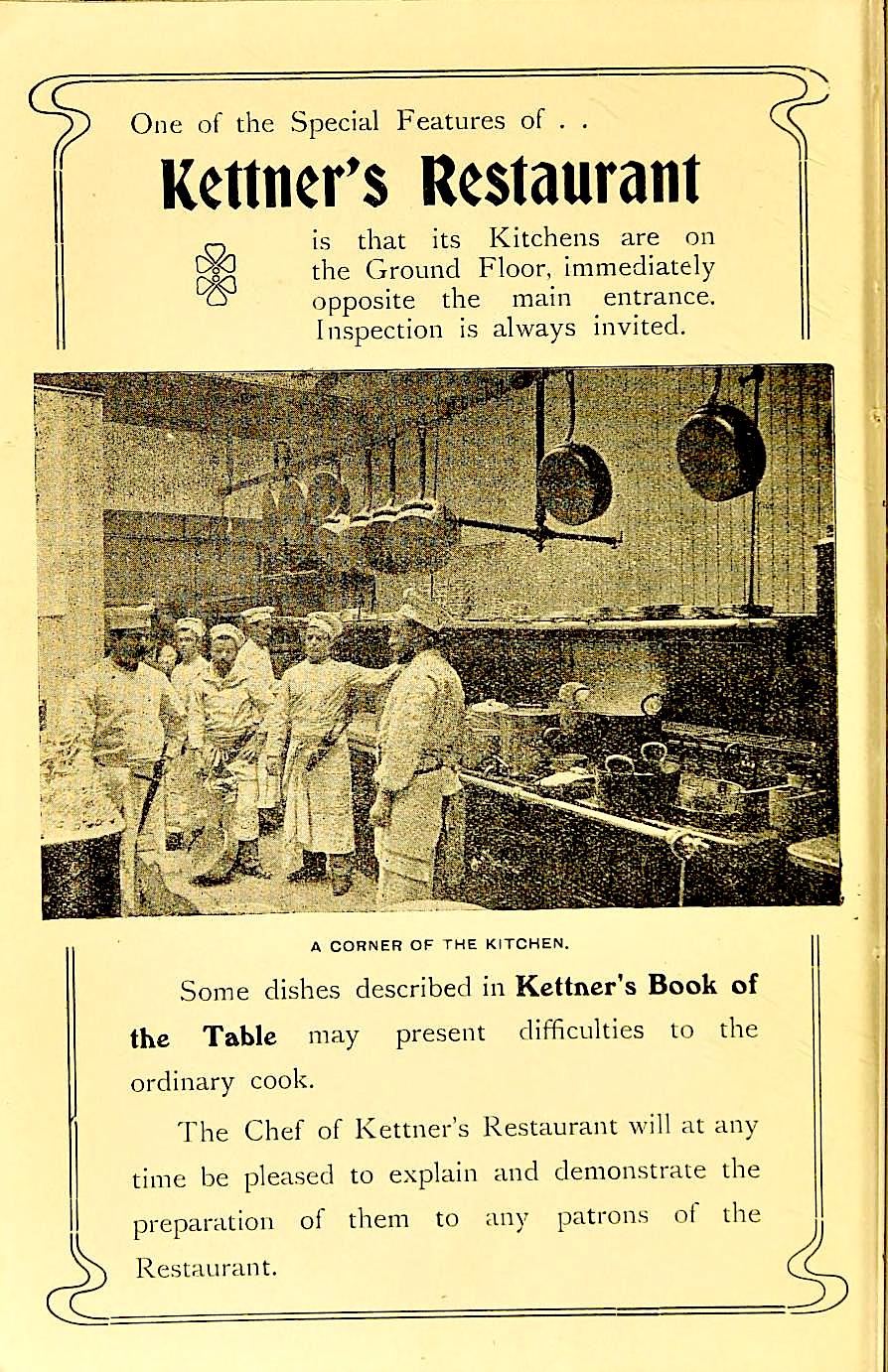[An entry from Kettner's Book of the Table (1877), which combined the recipes of the proprietor of the French restaurant in Soho, arranged alphabetically from "Absinthe" to "Zebu, the Indian ox," with a wealth of cultural commentary. - Graham Law]



Pages from an edition of 1912 in the Leeds University Library, from the Internet Acrhive.
[An entry from Kettner's Book of the Table (1877), which combined the recipes of the proprietor of the French restaurant in Soho, arranged alphabetically from "Absinthe" to "Zebu, the Indian ox," with a wealth of cultural commentary. - Graham Law]
Salad
Sydney Smith wrote a neat little poem to describe how salad should be prepared, and he promised that if his directions were followed -
Then, though green turtle fail, though venison's tough,
And ham and turkey are not boiled enough,
Serenely full, the epicure may say,
Fate cannot harm me - I have dined to-day.
There spoke the perfect epicure; and the speech goes to prove that the supremacy of enjoyment is based on simplicity of taste. There may be epicures who like to titillate their jaded appetites and acquired tastes with unheard-of luxuries and far-fetched combinations; but the world has long since recognised that all the best and healthiest pleasures keep well within bounds, and must never lose sight of moderation. Every art has its monstrosities; gastronomy has not been behindhand; and though he must be a bold man who will venture to blaspheme the elegancies of French cookery, there comes a time to every Englishman who may have wandered into a mistaken admiration of sophisticated messes, when he longs for the simple diet of his native land, and vows that the best cookery in the world, and that which satisfies the most refined epicureanism, sets up for its ideal - plainness of good food, and the cultivation of natural tastes. Now a salad is simplicity itself, and here is a marvel - it is the crowning grace of a French dinner, while, on the other hand, it is little understood and villanously treated at English tables. To that system of cookery which prides itself on its art it gives the charm of nature, and in the midst of the triumphs of gastronomy it raises a fine protest in favour of simplicity. In our own system of cookery, which boasts of its naturalness, and which therefore ought to hold the salad in highest honour, it occupies but an inferior place, and is nearly always spoilt. In respect of salads, therefore, the French and Italians have beaten us in our own line. We swear by plain cookery; we turn up our noses at elaborate sauces; we profess to eschew messes, and to care only for simples; and yet we have no idea, like the French and Italians, how to turn to splendid account a dinner of her is. There is a proverb which identifies such a dinner with meanness of fare; but it is not mean. It is quite certain that the majority of epicures agree with Sydney Smith that a really good salad will glorify any dinner, and make up for the lack of turtle and venison and the rarest dainties.
The fact is that a salad is more than food, and we are attracted to it by more than hunger. I am not enough of a chemist to go into details; but here are two facts which explain a good deal. One is that the most important herb used in salads, the lettuce, abounds in a juice which has not only the effect of opium, but where opium would be hurtful takes the place of it in pharmacy. The other is that the plant of next importance for salads, the endive or chicory, is largely used in its root as a substitute for coffee. These and like facts point to the conclusion that salads have an attraction for us over and above that of palatable food - an attraction which has its parallel in a man's craving for the tobacco-leaf, in a woman's craving for the tea-leaf, and in the passion which drives a Chinese to the poppyhead. In other words, a salad is not merely food, but has also an action on the nervous system, stimulating or sedative, which is immensely agreeable and acts like a spell. Whatever be the nature of the charm it is a powerful one, and renders the salad a sort of prince incognito among the assemblage of dishes. It has an undefinable rank on the table, which makes it more important than it seems. Without it, in the eyes of the epicure, the finest dinner has failed of its supreme relish; and to a very commonplace dinner it gives an ethereal grace. [390-92]
Link to Related Material
Bibliography
[Dallas, Eneas Sweetland.] Kettner's Book of the Table: A Manual of Cookery, Practical, Theoretical, Historical. London: Dulau, 1877. A HathiTrust online version of a copy in Leeds University Library. Web. 25 January 2024.
[Dallas, Eneas Sweetland.] "More About Salad," The World (8 September 1875): 233-234.
Created 5 February 2024